The German silent film Struensee/Die Liebe einer Königin (Ludwig Wolff, 1923) deals with the historical affair between the German court physician Johann Friedrich Struensee and the Swedish Queen Caroline Mathilde. The famous lovers were played by Harry Liedtke and Henny Porten.
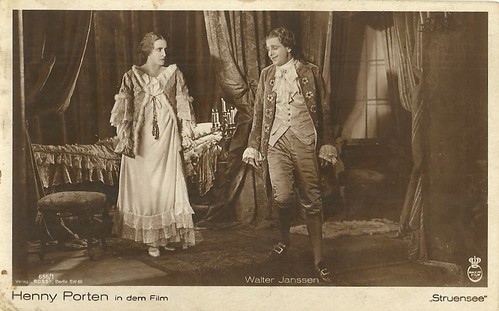
German postcard by Ross Verlag, no. 656/1. Photo: Maxim Film. Henny Porten and Walter Janssen in Struensee/Die Liebe einer Königin (Ludwig Wolff, 1923).
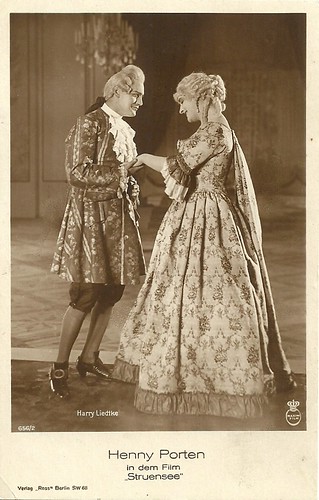
German postcard by Ross Verlag, no. 656/2. Photo: Maxim Film. Harry Liedtke and Henny Porten in Struensee/Die Liebe einer Königin (Ludwig Wolff, 1923).

German postcard by Ross Verlag, no. 656/3. Photo: Maxim Film. Henny Porten in Struensee/Der Liebe einer Königin (Ludwig Wolff, 1923).
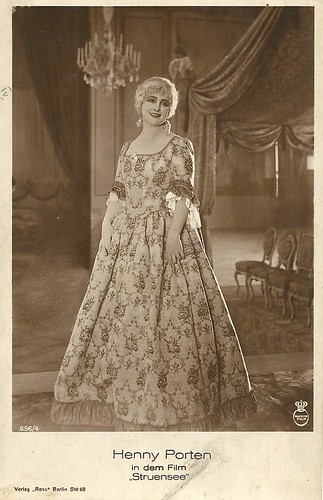
German postcard by Ross Verlag, no. 656/4. Photo: Maxim Film. Henny Porten in Struensee/Die Liebe einer Königin (Ludwig Wolff, 1923).
In 1766, 15-year-old Princess Caroline Mathilde (Henny Porten), youngest sister of King George III of England, is forced to marry her cousin, the notoriously insane King Christian VII of Denmark (Walter Janssen).
The Queen suffers from a forced pregnancy (she has a son with Christian), homesickness, and the insanity of her husband. Gradually Caroline Mathilde falls in love with Johann Friedrich Struensee (Harry Liedtke), the smart new personal physician and counselor of Christian.
She seduces him and gives herself the right to live her passion with the commoner. She even has an illegitimate daughter with him, Princess Louise Augusta, officially a daughter of Christian.
Struensee becomes de facto ruler of the kingdom and inspired by the Enlightenment he issues all kinds of reforms. Both are yet blind to the powers behind the screens. Christian VII at first tolerates the relationship of Caroline and Struensee but acts when the enemy clique in court, led by the Queen-Dowager (Olga Limburg), accuses Struensee and the Queen of high treason.
Struensee is killed, while the queen's children are taken away from her and raised by her enemies. She herself is exiled to Castle Celle near Hannover, where, three years after, she dies of scarlet fever.
Struensee/Die Liebe einer Königin (1923) was written and directed by Ludwig Wolff and produced by Maxim Galitzenstein for his Maxim Film studio. Their film premiered in Berlin on 14 September 1923.
Several novels and stage plays were written about the Struensee affair. It was also at the heart of Per Olov Enquist's popular novel Livläkarens besök (The Visit of the Royal Physician, 1999). Irony has it that many a European royal house has lineage with Struensee through his daughter, Princess Louise Augusta.
There were several film adaptations of the historical affair. In 2012 it was again filmed as En kongelig affære/A Royal Affair by Nikolaj Arcel, starring Mads Mikkelsen as Struensee, Alicia Vikander as the Queen and Mikkel Følsgaard as the King. The film had nominations for both the Academy Award and the Golden Globe for Best Foreign Film. At the Berlin Film Festival, Mikkel Følsgaard won the Silver Bear for Best Actor.
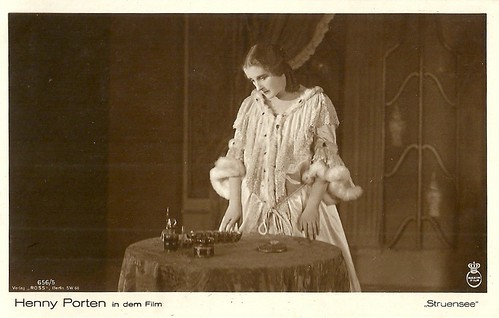
German postcard by Ross Verlag, no. 656/5. Photo: Maxim Film. Henny Porten in Struensee/Die Liebe einer Königin (Ludwig Wolff, 1923).
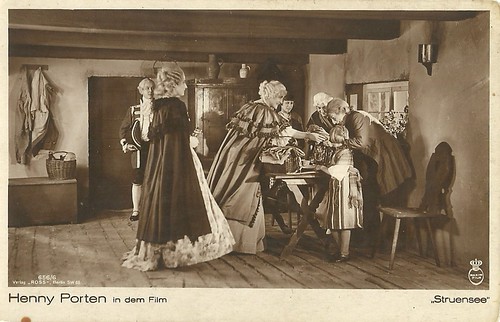
German postcard by Ross Verlag, no. 656/6. Photo: Maxim Film. Henny Porten in Struensee/Die Liebe einer Königin (Ludwig Wolff, 1923).
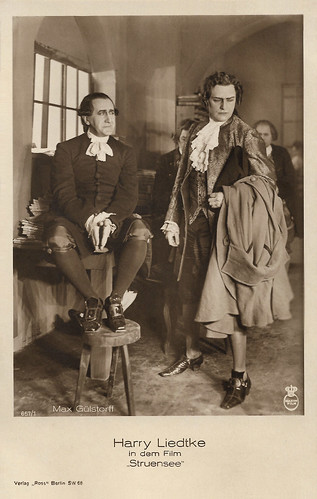
German postcard by Ross Verlag, no. 657/1. Photo: Maxim Film. Harry Liedtke and Max Gülstorff in Struensee/Die Liebe einer Königin (Ludwig Wolff, 1923).

German postcard by Ross Verlag, no. 657/2. Photo: Maxim Film. Harry Liedtke in Struensee/Die Liebe einer Königin (Ludwig Wolff, 1923).
Sources: Wikipedia, Filmportal.de, and IMDb.
This post was last updated on 9 December 2020.

German postcard by Ross Verlag, no. 656/1. Photo: Maxim Film. Henny Porten and Walter Janssen in Struensee/Die Liebe einer Königin (Ludwig Wolff, 1923).

German postcard by Ross Verlag, no. 656/2. Photo: Maxim Film. Harry Liedtke and Henny Porten in Struensee/Die Liebe einer Königin (Ludwig Wolff, 1923).

German postcard by Ross Verlag, no. 656/3. Photo: Maxim Film. Henny Porten in Struensee/Der Liebe einer Königin (Ludwig Wolff, 1923).

German postcard by Ross Verlag, no. 656/4. Photo: Maxim Film. Henny Porten in Struensee/Die Liebe einer Königin (Ludwig Wolff, 1923).
Forced pregnancy, homesickness, and insanity
In 1766, 15-year-old Princess Caroline Mathilde (Henny Porten), youngest sister of King George III of England, is forced to marry her cousin, the notoriously insane King Christian VII of Denmark (Walter Janssen).
The Queen suffers from a forced pregnancy (she has a son with Christian), homesickness, and the insanity of her husband. Gradually Caroline Mathilde falls in love with Johann Friedrich Struensee (Harry Liedtke), the smart new personal physician and counselor of Christian.
She seduces him and gives herself the right to live her passion with the commoner. She even has an illegitimate daughter with him, Princess Louise Augusta, officially a daughter of Christian.
Struensee becomes de facto ruler of the kingdom and inspired by the Enlightenment he issues all kinds of reforms. Both are yet blind to the powers behind the screens. Christian VII at first tolerates the relationship of Caroline and Struensee but acts when the enemy clique in court, led by the Queen-Dowager (Olga Limburg), accuses Struensee and the Queen of high treason.
Struensee is killed, while the queen's children are taken away from her and raised by her enemies. She herself is exiled to Castle Celle near Hannover, where, three years after, she dies of scarlet fever.
Struensee/Die Liebe einer Königin (1923) was written and directed by Ludwig Wolff and produced by Maxim Galitzenstein for his Maxim Film studio. Their film premiered in Berlin on 14 September 1923.
Several novels and stage plays were written about the Struensee affair. It was also at the heart of Per Olov Enquist's popular novel Livläkarens besök (The Visit of the Royal Physician, 1999). Irony has it that many a European royal house has lineage with Struensee through his daughter, Princess Louise Augusta.
There were several film adaptations of the historical affair. In 2012 it was again filmed as En kongelig affære/A Royal Affair by Nikolaj Arcel, starring Mads Mikkelsen as Struensee, Alicia Vikander as the Queen and Mikkel Følsgaard as the King. The film had nominations for both the Academy Award and the Golden Globe for Best Foreign Film. At the Berlin Film Festival, Mikkel Følsgaard won the Silver Bear for Best Actor.

German postcard by Ross Verlag, no. 656/5. Photo: Maxim Film. Henny Porten in Struensee/Die Liebe einer Königin (Ludwig Wolff, 1923).

German postcard by Ross Verlag, no. 656/6. Photo: Maxim Film. Henny Porten in Struensee/Die Liebe einer Königin (Ludwig Wolff, 1923).

German postcard by Ross Verlag, no. 657/1. Photo: Maxim Film. Harry Liedtke and Max Gülstorff in Struensee/Die Liebe einer Königin (Ludwig Wolff, 1923).

German postcard by Ross Verlag, no. 657/2. Photo: Maxim Film. Harry Liedtke in Struensee/Die Liebe einer Königin (Ludwig Wolff, 1923).
Sources: Wikipedia, Filmportal.de, and IMDb.
This post was last updated on 9 December 2020.
No comments:
Post a Comment